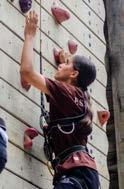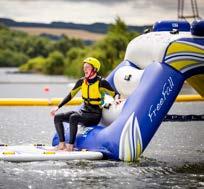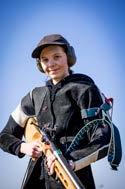






























Our December issue is packed full of fascinating interviews and features. We chat to Honorary Colonel of Derbyshire ACF Leigh Timmis to find out what inspired his incredible feats as a recordbreaking cyclist and adventurer. We also catch up with Dr Imogen Napper, a marine scientist at University of Plymouth, to find out what we can all do to help prevent plastic pollution in our oceans.
Two Army Cadets musicians reveal the fantastic opportunities open to cadets and CFAVs who want to learn musical instruments. We also discover just what it takes to be a cadet regimental sergeant major, the highest rank in Army Cadets. Read our feature
Copyright
on two outstanding cadets who’ve made the grade.
In the festive spirit yet? You will be after you've read our Christmas-tree chocolate brownie recipe on page 28. Give them a go.
Sending you all very best wishes for a happy Christmas and an adventurous new year.
Colonel Catherine Jardine Chief of Staff
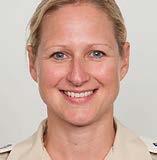
Disclaimer While every effort has been made to ensure that adverts, details and articles appear correctly, Army Cadet Magazine cannot accept responsibility for any loss or damage caused directly or indirectly by the contents of this publication. The views expressed in this publication are not necessarily those of its publisher or editor.
Army Cadet Magazine is produced by www.saltmedia.co.uk


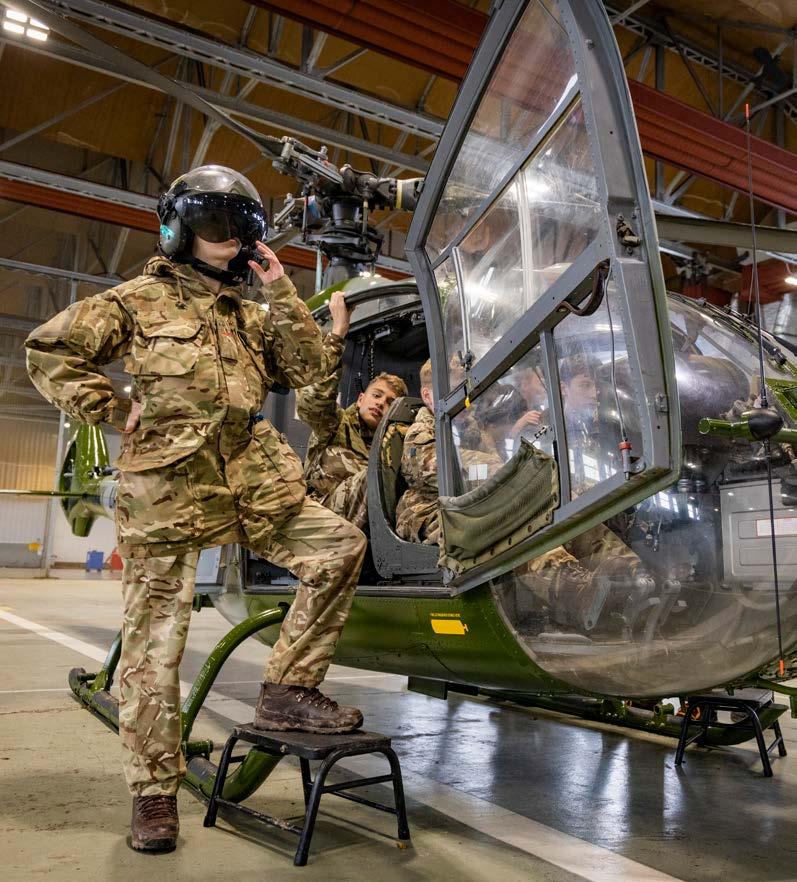
'A happy Christmas and an adventurous new year'
News from across the detachments.
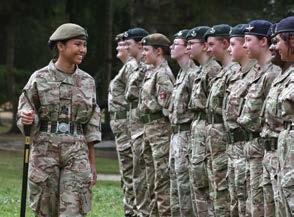


Meet world-record-holding cyclist and adventurer Honorary Colonel Leigh Timmis.


Two Army Cadets musicians prove there's no age barrier to mastering music.
We chat to Dr Imogen Napper, whose research into plastic pollution in the oceans has made headlines across the globe.
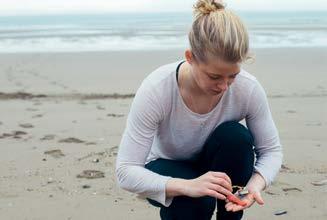

CCF cadets from Royal Hospital School (RHS) in Suffolk enjoyed an exchange with cadets from the US this year. American cadets from Georgia Military College (GMC) and the Riverside Military Academy (RMA) visited the UK in June and October.
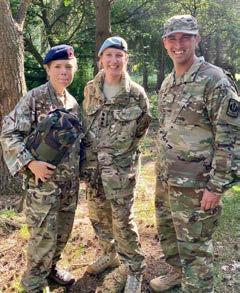
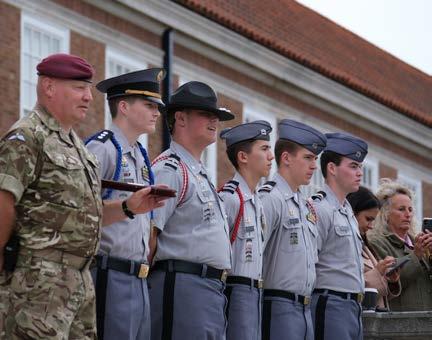
During the October visit, US cadets took part in four-day fieldcraft training, which included living in the field on military rations, learning leadership, and carrying out teamwork in various tactical scenarios.
As well as visiting London, the US cadets took a trip to Cambridge where they visited the American Air Museum at the Imperial War Museum Duxford and the Cambridge American Cemetery and Memorial.
RHS cadets spent nearly three weeks in the summer with GMC and RMA in the US, participating in academic, sporting and cadet activities. These included foot drill, dynamic rifle drill and Raider (an athletic competition) training.
The mutual visits were part of the Ex United Cadet exchange programme which centres around the commonality found in cadet activity through the CCF and US Army JROTC (Junior Reserve Officers’ Training Corps). The exchange provides cadets with an insight into the interdependence of nations and, in particular, the strong and special relationship between the US and the UK.


Army Cadets National Ambassador Jordan Wylie and Steve Guinness (AKA The Brick Consultant) led a fun and creative Lego workshop at the Army Cadets week-long STEM Camp at Westdown Camp, Salisbury. After listening to an inspirational talk from Jordan, cadets worked in teams to complete a mini Lego replica of his Great British Paddle stand-up paddleboard as well as a Lego ACCT UK logo.
The week-long camp (Ex STEM CHALLENGE), sponsored by ACCT UK, also included workshops and talks from adventurers Bernie Hollywood OBE and Paula Reid plus Jason Woodcock from Channel 4’s Hunted and former RAF tornado pilot Mandy Hickson.
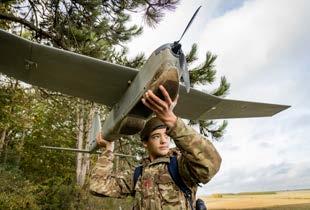
This year 250 cadets took part in the camp, where they received a series of presentations and hands-on challenges, all delivered by the Army’s leading STEM experts in six specialised areas and based around some of the most high-tech military equipment in the world. Workshops demonstrated how the Army's advanced STEM technology uses many of the same principles that cadets learn in their STEM lessons at school.
The aim of the camp was to enthuse cadets with a passion for STEM while encouraging them to think about how choosing STEM subjects at school could lead to interesting and rewarding career options.

Click here or scan the QR code to see the results of the Lego workshop.

The autumn half term is always a busy time for Army Cadets and all kinds of diverse and exciting events took place across the country and were attended by thousands of cadets from across the UK. Some of the activities supported by ACCT UK included a National First Aid Competition at Holcombe Moor, Army Cadet Band Camps at Altcar and Longmoor, STEM Camp in Salisbury and a trip to Cyprus by Shropshire Army Cadet Force.


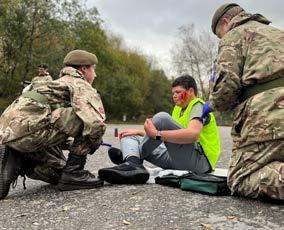
Three stalwarts of the Army Cadets community were honoured at the Soldiering On Awards in London this October.



Army Cadets National Ambassador Sally Orange won the Sporting Excellence Award for her outstanding multiple Guinness World Records, world firsts and charity fundraising. Diversity and Inclusion Advisor for Army Cadets Scotland Lt Col Gilly Moncur was presented with a Special Recognition Award for her unstinting efforts to ensure Army Cadets is an inclusive and welcoming youth organisation. Lt Gina Allsop of Sussex ACF came away with The Inspiration Award for her relentless fundraising work for Army Cadets, SSAFA, Sporting Force and animal rescue charities.
They were joined by Colonel Cadets 7 Brigade Leona Barr-Jones, who finally got the chance to celebrate face-to-face after her Defence Inclusivity Award win of 2020. The Soldiering On Awards recognise the outstanding achievements of those who have served in the Armed Forces as well those who work in support of the Armed Forces community.
Right: Army Cadets National Ambassador Sally Orange won the Sporting Excellence Award. Below: Lt Gina Allsop won The Inspiration Award for her fundraising

Two cadets from Ash Manor CCF have received an exciting four-year scholarship with the British Sub-Aqua Club (BSAC).

Corporal Beth and Lance Corporal Mikyle have been granted a fantastic opportunity to learn to dive and become future instructors with BSAC.
The scholarship will take them from entry-level ocean diver to open water instructor, with BSAC providing the courses and Divecrew (leading scuba diving specialists) giving them practical training and experience.
Beth already has a keen interest in marine conservation and would like to dive with sharks and turtles in the future, while Mikyle would like to swim with sharks and see different varieties of life under the water. The two scholars were selected for this training opportunity by
SERFCA (Reserve Forces’ and Cadets’ Association for the South East) and Divecrew. They will report on their progress and experiences so other cadets might be inspired to take up scuba training and discover more about the ocean environment.
Think you know how to protect yourself from criminals and scammers online? An eye-opening new Army Cadets video featuring National Ambassador Jordan Wylie and Brigadier Neville Holmes MBE reveals just how easy it is to become the victim of a cyber attack.
In the Cyber Security Awareness video, star of Channel 4’s Hunted and Celebrity Hunted Jordan Wylie helps three cadets (the chasers) track down key security information about fellow cadets just by searching for their personal details online.
The video illustrates just how easy it is for criminals to find out key security details about us if we don’t fully protect ourselves. Created in partnership with Army Cyber and CDS Defence and Security, it also has plenty of great tips on how to become cyber smart.
Click here or scan the QR code to watch the video.

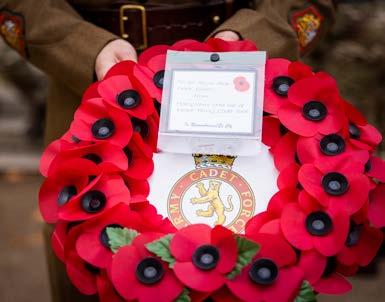
Cadets and adults from every detachment were out in force on the weekend of November 11-13 to take leading roles in Remembrance services, commemorations and parades. Cadets across the county laid wreaths, led parades and took part in ceremonies to help ensure that those who gave their lives for our country are never forgotten.
Pictured are a selection of cadets and CFAVs from Hampshire and Isle of Wight ACF and Newcastle Royal Grammar School CCF who were chosen to represent the Army Cadets nationally and make the journey to the Royal Albert Hall for the Festival of Remembrance on Saturday along with a march past the Cenotaph in Whitehall on Sunday morning.

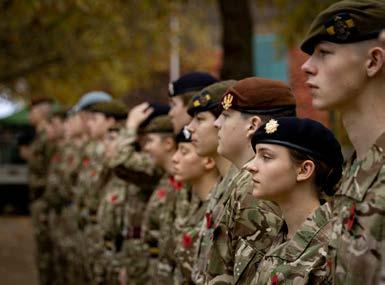

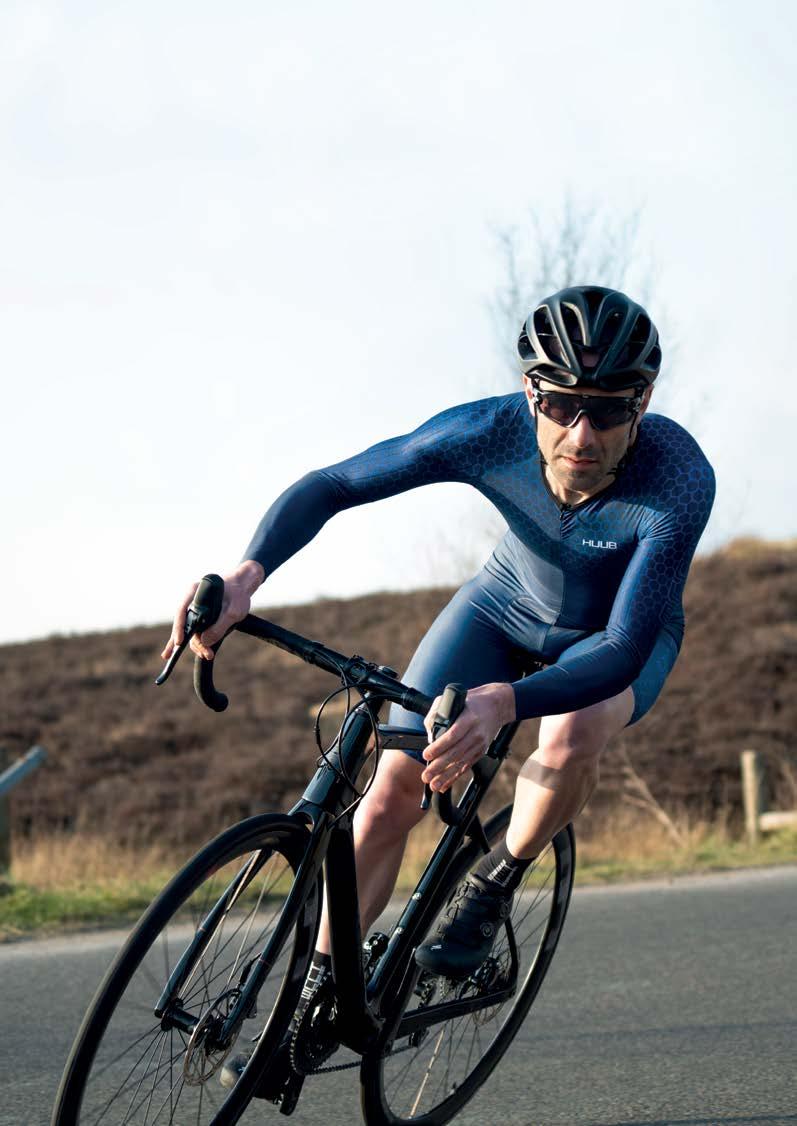 Honorary Colonel of Derbyshire ACF Leigh Timmis reveals how he became a record-breaking round-the-world cyclist and adventurer.
Honorary Colonel of Derbyshire ACF Leigh Timmis reveals how he became a record-breaking round-the-world cyclist and adventurer.
At 25 years old, Leigh Timmis had done everything he could to fit in with society’s expectations of what it means to be successful.
‘When I went to university I really focused on success; I was studying filmmaking and thought it was really important to get a first-class degree. With that, I might expect to come out of uni and get a great job and receive respect, rewards and good pay. So, while studying, I gave up the things I really loved in life, including cycling, to concentrate on doing well academically.’
Leigh subsequently graduated and landed a great job, but didn't find the expected sense of satisfaction in his success.
‘My friends had moved away after university and I lived in a house with people I didn’t really know. I then took on more and more work which led to feeling stressed and overwhelmed.’
Overworked, lonely and sabotaging his own life, he was diagnosed with depression and sought help from a counsellor.
That summer, along with two friends, Leigh acted on a whim and embarked on a month-long motorbike adventure across Iceland. The experience opened him up to a whole new world of possibilities.
‘We motorcycled across these volcanic deserts, wild camped under the midnight sun, swam in volcanic waters and walked across glaciers. I felt so alive! Why would I want to go back to a life that was so unfulfilling when there was so much opportunity in the world?’
While Leigh’s previous way of life had been governed by routine, this taste of adventure made him hungry for new experiences. Rediscovering his childhood passion for cycling, he set about his next big challenge.
In 2010, Leigh cycled 44,000 miles across 51 countries on an epic solo expedition. It took him seven years and he gave himself a budget of £5 per day.
Pushing the limits of cycling and human endurance, he rode his bicycle in some of the most inhospitable places on Earth, but also across some of the most magnificent. The life-changing experiences he encountered along the way fostered a life-affirming belief that his fellow human beings were intrinsically friendly and kind.
‘There were challenges, but I had to be brave and flexible enough to overcome them. I got very good at meeting new people and was often supported by the kindness of strangers I met along the road.
‘Having a challenge gave me a sense of direction, purpose and fulfilment. Every day I would wake up knowing I needed to find shelter and water but, after that, I could just see how things unfolded.
‘Imagine a life that had previously been so dark and unfulfilling, now being filled with that kind of excitement, spontaneity and adventure?’
On his return home, Leigh set himself another massive challenge. In 2018 he pedalled into the record books by becoming the fastest person to cycle across Europe, in a time of 16 days, 10 hours and 45 minutes. Cycling from the west coast of Portugal to the edge of Siberia – for 14 hours each day – he broke the previous world record by an astonishing eight days and seven hours.
‘Before I set off I had to know what challenges lay ahead, how I was likely to react to them and what steps could be put in place to make sure they didn’t prevent me from reaching my goal.’
'We wild camped under the midnight sun, swam in volcanic waters and walked across glaciers'



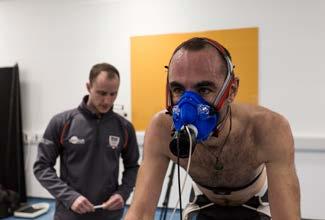
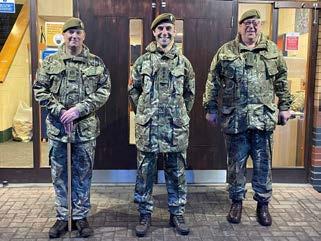

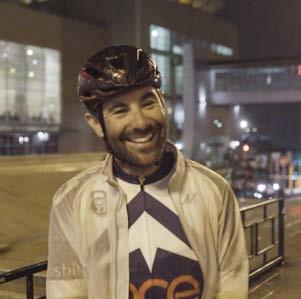
To this end, Leigh put together a team which included a fitness coach for a strong body, a nutritionist to help fuel his body for the challenges to come, and a physiotherapist to help him manage the physical demands of the feat. However, a physiologist from the sports science team at the University of Derby also advised him to take on the services of a psychologist.
‘My response was: “This is all about legs and limbs. I’m not going to be falling in love out there”. However, the physiologist said something to me that I now believe is the crux of any challenge, whether that is something you take on as a musician, dancer, parent, adventurer, sportsperson or artist. He said: “You can be the fastest cyclist in the world on the start line but it means nothing unless you have a mind that's strong enough to get you to the finish line”.
‘Out on the road, I quickly realised it was all about mental resilience. The body is able to keep going; it’s the mind that wants to give up. When it’s cold, wet and raining and you’ve been riding a bike for 14 hours a day for over two weeks, you start to wonder what it's all about. That’s when you need mental strength.’
This November, Leigh smashed the world record for the greatest distance cycled in seven days. The previous record was set in 1939 by long-distance cyclist Tommy Godwin and stood at 2179.66 miles. Leigh broke the record in the early hours of 13 November with a distance of 2230 miles. What made it so remarkable was that, for three days of this cycling challenge in Florida, conditions were affected by Hurricane Nicole.
As an ambassador for MQ (a leading UK mental health research charity), Leigh used the challenge to raise funds for mental health research. Knowing how much cycling, goal setting and adventure have positively impacted his own mental health for the better, his world record attempt was the perfect way to give back.
Choose something based around an activity you love. However, if you don’t know what to do, just take a step forward and choose something. You can always take further steps left or right later if it’s not quite right.
Be prepared to go out of your comfort zone, even if it feels difficult.
Set yourself a target.
Be your own project manager: set a timetable, plan what you will need and make lists. Get organised, create a schedule and learn time management skills.
Try and predict what challenges lie ahead, how you are likely to react to them and what steps could be put in place to make sure they don't prevent you from reaching your goal.
If you set yourself a physical challenge, remember to plan in recovery time. Create a lifestyle that will nourish the kind of growth you need to be able to meet the challenge.
Imagine yourself at the finish line. When you feel like giving up or easing off, ask your future self at the finishing line for advice. What would your future self tell you to do right now?
In difficult moments, ask yourself what sort of person you want to be: one who gives up or one who gives it everything?
Good sleep is the best tool you have for maximum performance.
Bear in mind that behind any so-called “instant success” usually lie decades of hard work and failures.
Don’t just focus on the end achievement; enjoy the journey of getting there.
During your challenge, focus on gratitude: get up in the morning and find three new things to be grateful for.
Click here or scan the QR code to watch Leigh tell his story.

'Out on the road, I quickly realised it was all about mental resilience'
 Photo: Kate Knight
Photo: Kate Knight
British Army veteran Michael, 66, is living proof that you’re never too old to learn something new.
Having been a CFAV for 30 years, there were few areas of Army Cadets life that he hadn’t experienced. However, that didn’t stop the British Army veteran challenging himself to take up not one but two instruments.
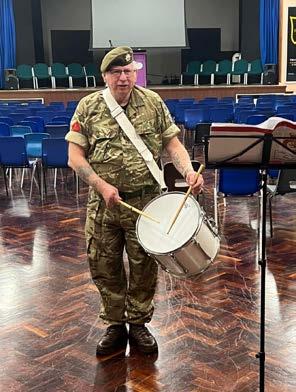
Despite the fact that he’d never played an instrument before, his wife encouraged him to attend a band camp in 2019. He took the plunge, only to discover he had an aptitude for playing the drums.

‘I found I could keep time with the tune even though I don’t read music,’ he says.
However, just as he discovered this new passion, Michael was forced to abandon music-making because of the pandemic. His wife then sadly passed
away during lockdown and that, coupled with other family bereavements, left Michael thinking he’d probably never play music again.
Then, in 2021, an opportunity arose to attend another band camp and, with his wife’s words of encouragement echoing in his ears, as well as the support of his fellow CFAV colleagues, he decided to enrol.
‘I went back on a refresher course to enhance my knowledge and I’m glad I did,’ says Michael. ‘I didn’t have to be retested as I’d already done the course and passed, but I did an adult induction course to help me read music.’
Michael now plays in The Corps of Drums of Cleveland ACF (which comprises cadets from three county detachments). The main instrument is the snare drum, although it’s accompanied by other drums like the bass and tenor, as well as flute, cymbals and bugle.
‘You’ve got to take up two instruments,’ explains Michael. ‘I’ve mastered the drums but I’m still learning the bugle. I’m also learning how to do the drum major’s mace (baton) drill, so I can teach it to cadets.’
As part of his role as an adult volunteer instructor with the Coulby Newham detachment, Michael teaches the 1-star syllabus – something he takes great pride in.
‘When I see a young person taking strides in music, I think it’s absolutely fantastic. To see them do something they never thought they’d be able to do and then master it ... that’s my reward.’
Michael has discovered a sense of camaraderie in The Corps of Drums: he enjoys making new friends, teaching young people and playing at live events.
Having learned to play in his 60s, he encourages others to take up an instrument: ‘If I can do it, anybody can,’ he says. ‘It’s a challenge but even if you’re unable to master one instrument, you could end up playing another. It’s fantastic.’
‘I’m one of the oldest people to take up drums in Army Cadets’
Army Cadets offers incredible opportunities for cadets and CFAVs to learn musical instruments – at any age. We meet two accomplished musicians who are banging the drum for piping and drumming.
Joe, 15, started piping seven years ago and is a rising talent at Army Cadets’ Pipes and Drums Colinton detachment in Edinburgh.
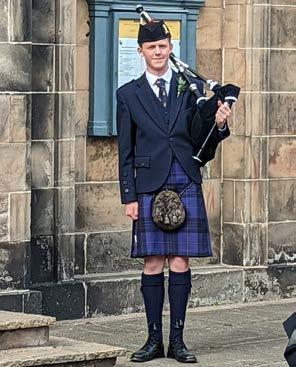
It was an ex-cadet instructor who spotted Joe’s aptitude for piping and encouraged him to take it to the next level.
‘My mum and grandma really wanted me to play the pipes, so I started when I was ten with weekend lessons run by Edinburgh Council,’ he says. ‘The teacher who ran those sessions then introduced me to tutor Pipe Major Mike Pretsell who suggested I join Pipes and Drums Colinton when I turned 12.’

Playing the bagpipes is a real labour of love. Pipers start by learning the chanter (the wooden part of the bagpipe where you play the melody with your fingers) before gradually adding the drones (the pipes that produce the bagpipes’ unique sound). Joe spent two years learning the chanter and then another year learning the full pipes.
‘When you first start playing bagpipes you don’t switch on any of the three drones as they take up too much air. You gradually build up your skills until you’re playing with all three of them. It feels really special when you get to that stage because you can hear their full sound.’
Now, three years since becoming a cadet, Joe plays with 15 other musicians in his detachment and has achieved SCQF level 5 (equivalent to 3-star) in piping. As part of his cadet training he’s also required to take part in other activities, including gaining his 1-star Army Proficiency Certificate.
‘I especially enjoyed taking drill. I know a lot of people don’t, but I quite like shouting. Maybe, as a piper, I like being loud!’
Rather than scaling the ranks or entering competitions, Joe’s focus is on playing the bagpipes for the enjoyment of it. He says:
‘I’ve made some great friends through piping and Cadets. At this point, I’m enjoying my piping rather than competing. I just want to get the SQF qualifications and do tattoos and gigs.’
As well as playing with his detachment, Joe plays the pipes at a care home for the elderly and recently played his first wedding. Happily, he finds the adrenaline that comes from playing trumps any nerves.
‘When you really enjoy it, nerves aren’t a massive factor. Also, Pipe Major Pretsell always said that only one per cent of the audience can hear 99 per cent of the things you can hear. Not many people can tell if you make a little mistake.’
Looking to the future, Joe’s unsure what direction his life might take but he’s confident that piping will be a part of it: ‘I’m not sure music will become a job, but I definitely want to make time for it, and I would like to return to Army Cadets as an adult volunteer and teach other cadets.’
‘I’ve made so many friends through piping and Cadets’

WEIGHT 1,650g
SIZES 3-13 (no half sizes)


Designed specifically for use with the latest issue PCS uniform, these Delta Patrol Boots are constructed from high-quality leather (in MOD-brown colourway) to provide maximum durability and support.

Being crafted entirely from leather means the boot can be polished to a gleaming shine for parade or waxed for durable and waterproof use in the field. In addition, the boot has a soft lining with genuine Thinsulate thermal material which assures comfort and warmth.
The boots also feature supportive padded ankle collars, oil- resistant cleated rubber soles, strong nylon laces, MOD-brown metal eyelets and removable inner soles. The lacing system combines both eyelets and D-rings for ultra-quick lacing.
Prices: £39.96 (UK sizes 3 to 6) and £47.95 (UK sizes 7 to 13).



Dr Imogen Napper’s research into plastic pollution in the oceans has made headlines across the globe. The marine scientist (AKA 'the plastic detective') reveals how everything from microbeads to microfibres are a threat to sea life – and what we can all do to #EndPlasticSoup.
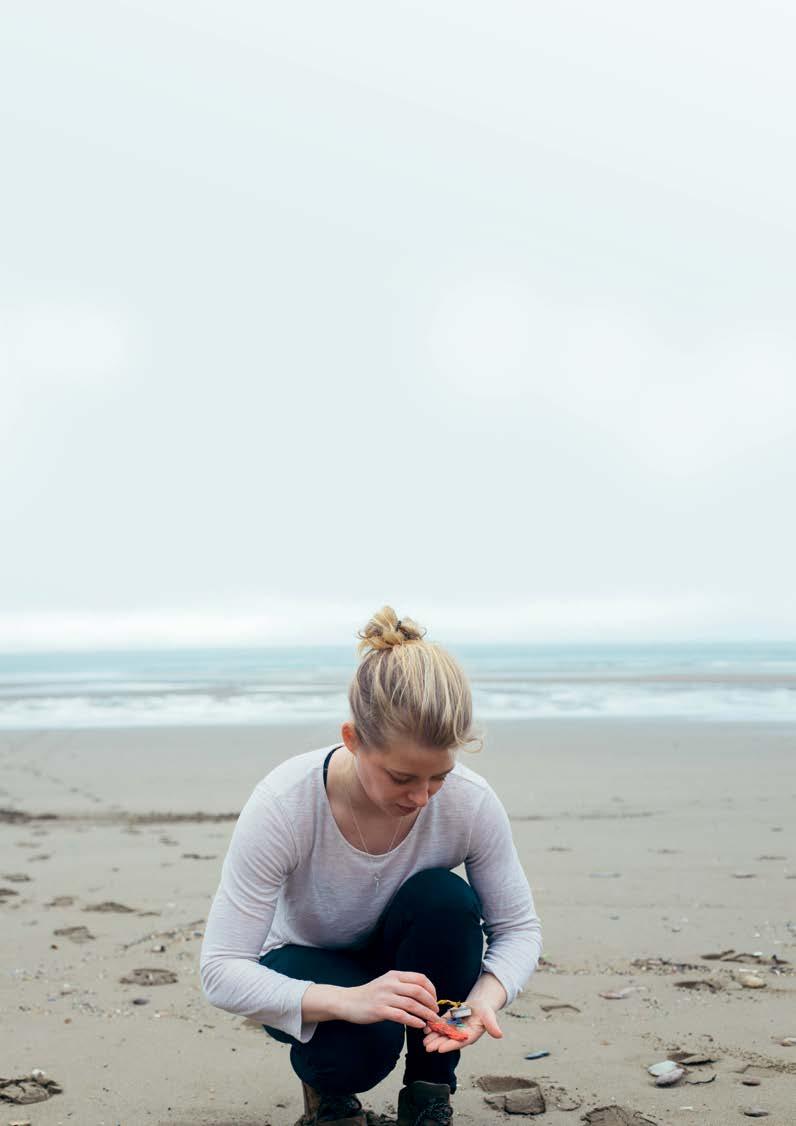
'All the plastic ever made is still on the planet’
Dr Imogen Napper is passionate about investigating the sources of plastic pollution.
As a post-doctoral researcher at the University of Plymouth she has looked at how fibres can come off our clothes in a typical wash, how there can be up to 3 million microbeads in a facial scrub bottle and how biodegradable carrier bags could still hold a full bag of shopping after being in the sea or buried in the soil for over three years.

Imogen, who is also a Royal Navy reservist, is fired up about helping us all better understand what we can do to limit the impact of plastic pollution on the planet and in the oceans.

Since Sir David Attenborough highlighted the scale of plastic pollution in the world’s oceans in his documentary Blue Planet II in 2017, public attitude towards plastic has changed. There's been a drive to curb its use and prevent it from ending up in our waterways. However, according to Imogen, it's still posing a huge problem.
'Plastic is convenient, cheap and has revolutionised our lives for the better in many ways,' she says. 'However, we are absolutely surrounded by it – everywhere you look you’ll see plastic. And, while it may have solved a lot of our problems, it generates a huge amount of waste which has created a new problem.
‘It’s estimated that all the plastic ever made is still on the planet today – unless it’s been burnt – because it’s so durable. And it has made its way into our natural environment because we don’t know what to do with it.’
In the water samples Imogen has taken from various oceans, seas and rivers around the world, she

estimates that around 80 per cent of them contained plastic. The sheer amount of plastic in the oceans is smothering the seabed, while the chemicals in plastic are making their way into marine life – with detrimental effects.
If you recycle and never litter, you’re not adding to the ocean-plastic problem, right? Wrong. According to Imogen, littering is only the tip of the iceberg when it comes to plastic pollution.
‘Take an average day,’ she says. ‘You’ll wake up in the morning, brush your teeth and have a shower. Until recently, toothpaste and shower gel included microplastics which would wash down the drain after use.

'You’ll then put on clothes made with plastic fibres. When you move, those plastic fibres may shed off your clothing – and will shed when you wash them.
'Then you’ll make some food – which may be packaged in plastic. Some of it will be recyclable, but some of it won’t and that’ll end up in landfill.
'You get in the car to drive to school or college. As you drive, tiny plastic fragments flake off the tyres to be washed into a drain the next time it rains and may eventually end up in a waterway.
‘Plastic is such a huge part of our lives that recycling won’t stop it from ending up in the sea.’
The idea of plastic pollution can be overwhelming, but Imogen stresses that everyone can be part of the solution.
‘One person can make a huge difference,’ she says. ‘It’s cheesy but it’s true. For example, if you switch from a facial scrub that uses microplastics to one that doesn’t, you’ll stop millions of tiny plastic particles from entering the ocean.
‘Part of the solution is taking ownership of our shared environment. There’s wildlife and beauty everywhere and we need to look after it. If you see someone drop litter, pick it up if it’s safe to do so and dispose of it correctly – someone might see you do it and be inspired to do the same. Good practice can spread like wildfire and suddenly there's a whole army of people protecting the planet.'
Alongside conducting ground-breaking research into ocean plastics, Dr Imogen Napper is also a National Geographic Explorer and Sky Ocean Rescue Scholar. Here's how she broke into her career.
Like most teenagers, Imogen had no idea what she wanted to do when she was older. Growing up in the coastal town of Clevedon in north Somerset, she had a natural affinity with the sea and had always enjoyed science lessons, but it hadn’t occurred to her to combine the two in a career.
‘Marine science wasn’t even on my radar,’ says Imogen. ‘At university, I chose to study biomedical sciences but was still unsure of what I wanted to do afterwards.

'While at the University of Lincoln, I had a supportive mentor and supervisor who suggested that I think about what I enjoy in life and use that as a springboard for my career path.
‘As a keen surfer, I was already doing beach cleans and marine conservation in my spare time but naively didn’t think I could make a career out of it. My mentor opened my eyes to the fact that anything can be researched and that most research is inspired by the researcher’s passion.’
After completing a master’s degree in biotechnology, Imogen studied for a PhD in marine science and, more specifically, sources of plastic and their impact on the marine environment.
‘Ocean plastics interested me because I’d seen a noticeable change in the amount of litter on the beach near to where I grew up. When I was younger,


I remember almost never seeing plastic washed up on the sand but, seeing the beach get more and more polluted over the years, I couldn’t just sit by and watch it happen; I wanted to be part of the solution.'
In addition to her work conducting research at the University of Plymouth, Imogen also has the rather cool title of National Geographic Explorer. It means that National Geographic have supported her research and she’s part of a small band of scientists who can call themselves official explorers.
‘It’s fantastic to be a scientist and use a platform such as National Geographic to reach a wide audience and make a substantial change in your area of research,’ says Imogen.
As part of her research with National Geographic, Imogen followed The Ganges all the way from the Bay of Bengal to The Himalayas. She and her team tracked microplastics from source to sea to find out how much was going into the ocean. However, as exciting as globetrotting fieldwork can be, she also stresses that exploration doesn’t have to happen hundreds of miles from home.
‘My first piece of research with National Geographic was actually at my lab at the University of Plymouth where I’m based,’ she explains. ‘You don’t have to go to the ends of the earth to do exciting research – it can be in your lab or nearby natural surroundings.’
From Imogen’s experience, a career in research can be both rewarding and exciting.
‘Research is fantastic because you can sink your teeth into a project you’re passionate about. If you’re a curious person, you’ll love it as it’s all about finding answers.'
If a career in research appeals to your inquisitive nature, Imogen recommends identifying the area you’re most interested in and then reading as much around the subject as possible.
‘Research is all about answering questions. It all starts with reading and investigating a gap in the research and then, once you’ve built up that knowledge and see a question that needs to be answered, you conduct field or laboratory research to try and find evidence to answer that question.
‘It’s amazing to be able to say, “I’m the first person on the planet to answer that question" and to put your own stamp on the world.’

Watch a video about Imogen's work here or by scanning the QR code.
Click here or scan the QR code to watch Imogen's YouTube video for tips on how to use less plastic.





Click here or scan the QR code to listen to an interview with Imogen on the impact plastics are having on our oceans.
Click here or scan the QR code to discover WWF's ten easy tips to reduce your plastic use.
The 2 Minute Foundation shows how you can help clean up the planet two minutes at a time. Click here or scan the QR code to find out more.
INSTAGRAM Follow Imogen (@imogennapper) on Instagram
'As part of her research with National Geographic, Imogen followed The Ganges all the way from the Bay of Bengal to The Himalayas'
Menstruation has lost its taboo status as a result of campaigners raising the issue of period poverty, schools providing sanitary products, and ecofriendly period gear going mainstream. However, one issue that's still covert is: how do you manage menstruation on expedition? We ask adventurer and Army Cadets National Ambassador Sally Orange for her advice.
Attitudes towards periods have changed drastically in the UK in the last 40 years and there are loads more opportunities for women to take part in expeditions in extreme environments.

Menstruation shouldn't affect a person’s ability to undertake adventurous sports. But, according to Army Cadets National Ambassador Sally Orange, it is something that should be planned for.


Sally, who has completed some of the toughest endurance events on the planet and undertaken expeditions in a range of challenging environments, says: ‘It’s always good to prepare as much as possible before undertaking an endurance event or an expedition, but you can’t predict every eventuality.
‘The first time I went to the Arctic I didn’t think twice about storing my tampons in my pack and, when I went to retrieve one, they were frozen stiff. It’s safe to say after that I kept them close to my body to keep them warm.’
Thanks to modern technology, there are apps that can track periods and these are helpful when planning for expeditions and events. However, Sally advises that you pack for all eventualities.
‘There are lots of things you can’t predict,’ says Sally. ‘The physical stress of an endurance event on your body can alter your cycle, bringing your period on earlier than expected or delaying it. If you’re on expedition for a number of days it can throw your usual cycle off course.’
However, trackers are generally quite accurate and may still be useful. Sally suggests using them to track PMS symptoms such as mood changes and cramps.
‘Cramps were often a problem for me, but thankfully I found that being active helped to soothe them. With period trackers being so advanced now, they can be really useful for knowing when to expect symptoms and pack accordingly (such as ibuprofen for cramps).
‘Being able to track your moods and understand why you’re feeling a certain way can also be reassuring.’
If you do happen to get caught out and get your period unexpectedly while on an Army Cadets expedition, don't panic. Army Cadet expedition leaders always carry a special kit which includes tampons, sanitary towels and spare underwear. Just ask and you'll be sorted.
• Take a resealable, reusable plastic bag with a slide zip for storing used period products and then dispose of them when you get home.
• Consider using a menstrual cup so you don’t have to carry any products around with you.

• One of the great things about combat uniform is that if you do leak it probably won’t show. Period pants can also be useful.
• If you’re not feeling 100 per cent, don’t suffer in silence – tell a friend or your section commander.
• Tampons also make excellent wound dressings and can stem the flow of bleeding noses. Bring extras just in case!
Click here or scan the QR code to read a DofE feature on how to plan for a period on an expedition.

Click here or scan the QR code to find out about period tracker FitrWoman. It combines menstrual tracking with useful insights to help you train and eat in a way that is in tune with your cycle.

Ashanti arrived in Yorkshire from the Philippines in 2016. Just six years later at the age of 18, she was appointed Cadet RSM of Yorkshire (North and West) ACF with responsibilities which included commanding up to 400 cadets in county parades. Ashanti attained the skills and qualifications needed for the role (something very few cadets achieve), despite having to face additional challenges.
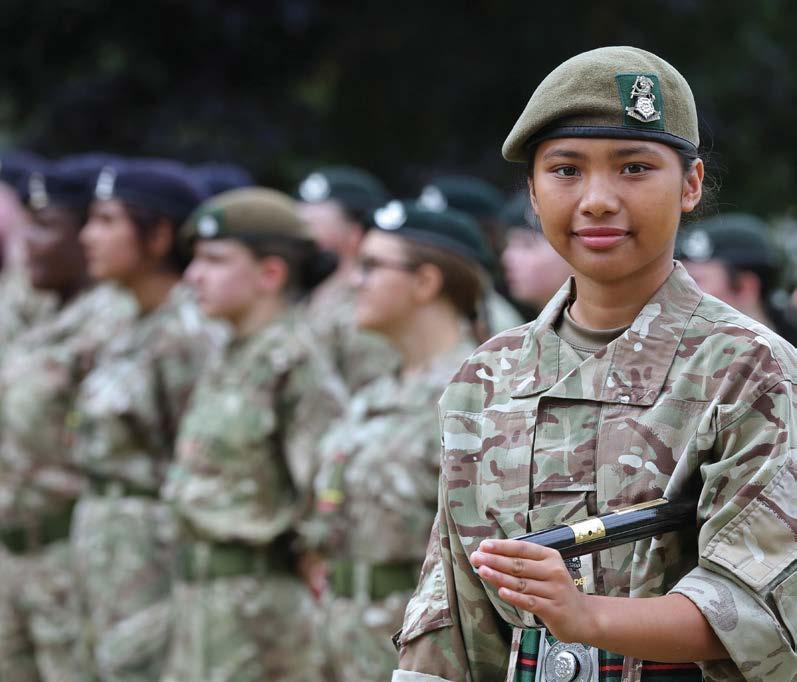
‘My brother joined Cadets before me and he loved it so much I decided to join too,’ she says. ‘I hadn’t been in the UK long then, so there were lots of things I had to get used to: a new home, new school and new friends. Cadets provided a community and helped me find my place in a new country.
‘I’ve absolutely loved the opportunities Cadets has given me and I’ve made the most of every single one. I’ve loved raising money for charity,
climbing mountains and even playing rugby – which is quite something for a four-foot-nine girl.’
Ashanti’s Detachment Instructor, Lewis Wilde of Northallerton Detachment, said: ‘It’s been amazing watching Ashanti transform from a shy newcomer to the outstanding cadet she is now. She is respected by all who meet her and I’m immensely proud of her achievements. She brings sunshine and positivity to the detachment, as well as huge amounts of self-discipline and commitment to any task.’
Reflecting on Ashanti’s success, Commandant Fred Owen is in no doubt about the excellent example she has become and the inspiration she offers fellow cadets.
‘Ashanti demonstrates what young people can achieve. She has risen to the very highest pinnacle for a cadet. Since joining, she has embraced every
Ashanti Mai Holden, Cadet RSM of Yorkshire (North and West) ACFWhat does it take to be cadet regimental sergeant major (RSM)? We chart the rise of two cadets who’ve reached the highest rank in Army Cadets.
opportunity given to her. As well as mastering the English language, she has become a fantastic ambassador for mental health by supporting her fellow cadets throughout the pandemic. I’m delighted she has succeeded in achieving the rank of regimental sergeant major.’
County Regimental Sergeant Major Instructor, Warrant Officer Class 1 Austin Butler, is also impressed with Ashanti's progression within Army Cadets.
'Ashanti commands the respect of all the cadets and shows the qualities needed to be a remarkable regimental cadet sergeant major. She has a positive outlook in everything she takes on and inspires her fellow cadets to be the very best they can be.’
Ashanti hopes to join the Royal Corps of Signals when she finishes her education, and will no doubt excel in a career in the British Army.
To be eligible for the role of cadet regimental sergeant major (RSM), cadets must first complete the Master Cadet Course. The course is open to 4-star cadets over the age of 16, with a minimum rank of sergeant, who have completed Fieldcraft as a progressive subject and qualified on the Senior Cadet Instructors' Cadre (SCIC).

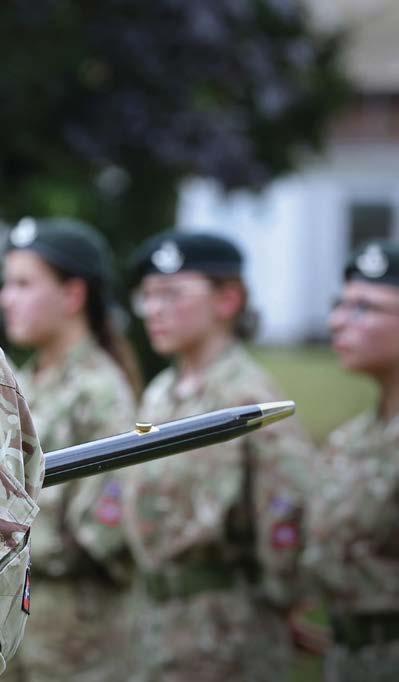
To be eligible for the Master Cadet Course, cadets should also have passed a weapon handling test on the L98A2 Cadet GP Rifle and, among several additional recommendations, are expected to have a good understanding of section battle drills and be fit enough to complete the physical elements of the course.
On completion of the Master Cadet Course, cadets can be considered for appointment as a cadet RSM, at the discretion of ACF County Commandant. Only one company sergeant major (CSM) in a county will be selected to be its cadet RSM. They are the most senior cadets in the ACF and often take on ceremonial duties in the local area.
'I've absolutely loved the opportunities Cadets has given me and made the most of every single one'
Erin joined Merseyside ACF in 2018 and, for the past five years, has embraced the full Army Cadets experience, despite the challenges of Covid-19. From daunting early adventures such as first trips away from home, to fine-tuning her training on the Master Cadet Course, Erin has taken the positives from every occasion.
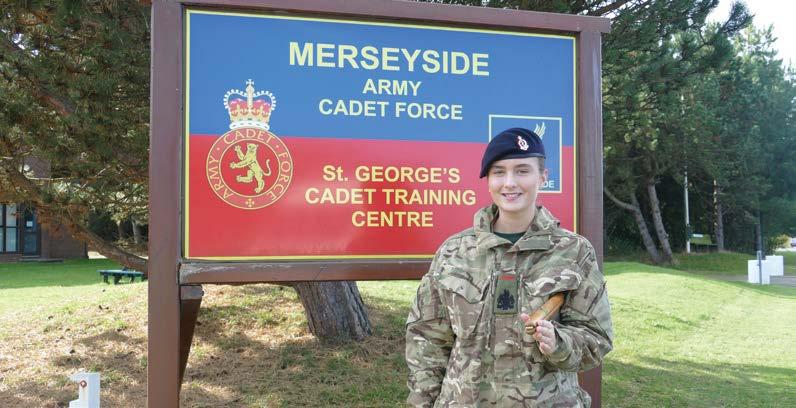
‘I found Cadets engaging right from when I was attending camps as a junior cadet, so the years have flown past,’ she reflects. ‘It was a huge milestone when I reached the stage of being able to advance beyond 4-star and attend the Master Cadet Course at Frimley Park.
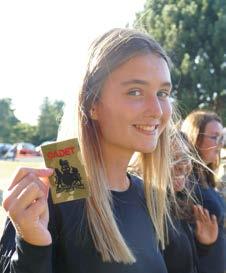
amazing experiences and insights into best practice which I’ve been able to take back to my own unit.
‘As cadet RSM, you need to hold yourself to the highest standards in order to set an example for other cadets to follow, and to demonstrate your own integrity and belief in the core values of Army Cadets. I’ve developed as a cadet by constantly reflecting on my actions and decisions, and by being open to new approaches, and I try to support others to do the same.’
As she nears her 18th birthday, Erin is approaching the end of her time in Cadets but is looking forward to transferring her skills and qualities to a career in medicine.
‘The course was one of my most enjoyable Cadets experiences – I was fully immersed in the battle picture of every section attack. It was a great chance to put my knowledge into practice, supported by the CFAVs and regular soldiers who helped us appreciate the importance of leadership and teamwork – even when we were tired and fed up.’
The honour of being selected for the role of cadet RSM brings with it a responsibility to uphold and reflect the core values of Army Cadets, something Erin recognised and took pride in.
‘I was promoted on my annual camp, so was able to make the most of the position immediately by getting involved with training and making sure the cadets had the best experience possible. Since then, I’ve also visited units around my county, which provided
‘The medical profession shares many values with Cadets: those of compassion, inclusiveness, integrity and respect. I’ve developed all those in Cadets –along with skills in leadership, confidence-building, time management and teamwork – and I’m looking forward to applying them to my future career.'
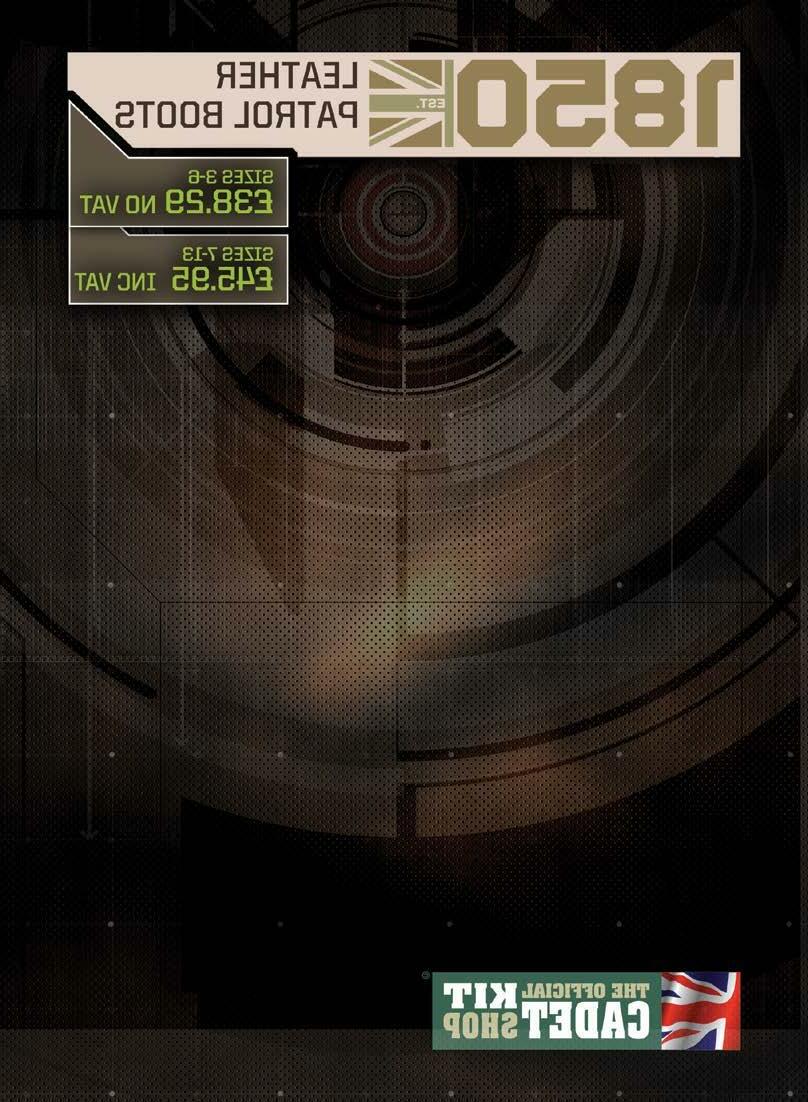

 Erin Donovan, Cadet RSM of Merseyside ACF
Erin Donovan, Cadet RSM of Merseyside ACF
'As cadet RSM you need to hold yourself to the highest standards'











These cute Christmas-tree-shaped treats jam all of the crowd-pleasing flavours of chocolate orange and festive spices into one gooey bite.


Dark chocolate 185g, snapped into pieces

Salted butter 185g, chopped into pieces
Free-range eggs 3 large, lightly beaten
Soft brown sugar 250g
Orange 1, zest of Plain flour 110g Salt a pinch
Ground cinnamon 2 tsp

Nutmeg a pinch
Mixed spice a pinch
(makes 8)
Round cake tin around 22cm diameter
Baking parchment
A large mixing bowl and hand whisk or stand mixer
TO DECORATE
Green icing bought or homemade (see over)
Edible silver balls and other cake decorations
Lolly sticks 8 or Christmassy paper straws 4
1. Lightly butter the inside of the cake tin (use the wrapper of a packet of butter to gently spread the butter around the tin).
2. Place the bottom of the tin on the baking parchment and use a pencil to make an outline of its shape by drawing round it on the parchment. Cut the paper shape out to line the bottom of the tin. Place the side of the tin on the parchment and mark out its depth, then cut a long strip of the same width and use it to wrap around the inside of the tin. Don’t worry if it sticks out of the top of the tin a little.
3. Preheat the oven to 180°c / gas 4.
Cinnamon that’s been languishing in the cupboard for a year or more will have lost most of its flavour, so you’ll need to add a lot to be able to taste it. If you can get your hands on a fresh jar, the brownies will taste better.
4. Weigh out the ingredients and put them in separate bowls ready to use.
5. Put the butter and the chocolate in a microwaveable bowl and heat for about 4 minutes, stirring halfway through. Leave to cool slightly.
6. Pour the eggs, sugar and orange zest into the large mixing bowl of a stand mixer and, using the balloon whisk attachment, beat until fluffy and pale in colour. You could also do this using a hand whisk but it takes a bit of effort!
7. Stir the chocolate and butter mix into the beaten egg and sugar, gently folding the mixture in order to keep as much air in it as possible.
8. Pour the cinnamon, nutmeg and mixed spice into the flour, then sift all of these dry ingredients into the chocolate mix. Do this in three stages, gently folding in each time.
9. Pour the mixture into the prepared tin and put in the centre of the preheated oven. Set a timer for 30 minutes, but check after 25 minutes. When the brownies are cooked they will have a papery top and feel firm to the touch but still have a bit of wobble to them. The secret to a good brownie is to take them out of the oven before they are fully cooked, in order to preserve a slightly gooey centre.
10. Leave the brownies to cool in the tin and then carefully lift out and cut into eight triangle shapes by cutting the circle in half, then half again, and then cutting the quarters into eighths. If you want them to look really neat you could trim off the bottom of each triangle to make it straight like a Christmas tree. It's not essential though – people usually like the chewy bits of the brownie best.
11. Stick a lolly stick or half of a Christmassy paper straw in the bottom of each to resemble a tree trunk.
The cinnamon, nutmeg, mixed spice and orange zest are what make these brownies taste Christmassy, but if you haven’t got any or all of these flavourings, don’t worry as the recipe will deliver classic brownies instead.

• Use homemade or shop-bought green icing to help bring out the Christmas tree vibe.
• To make your own, you'll need 150g of icing sugar and a couple of drops of green food colouring. Mix a small amount of water into these (drop in a dessert spoon of water at a time so it doesn't get too runny too quickly). You are aiming to create a thick icing that will run off a teaspoon.
• If you are using shop-bought green icing in a tube, carefully pipe the icing in the shape of tinsel running across the tree.
• If you are using homemade green icing, use a teaspoon to pick up a little of the icing and drizzle it over the brownie.
• While the icing is still wet, decorate with edible Christmas decorations. It's Christmas so the more sparkly and over the top the better!
• If you don't have any green food colouring or edible decorations, you can create a very charming snow-like effect by using white icing, similar to the decoration on these cookies pictured left.

Throughout a busy 2022, CVQO has had great success working with and celebrating the achievements of cadets and adult volunteers. Here's what went down.
CVQO was thrilled to be able to visit almost 30 summer camps across the UK and spread the word about its fantastic BTEC Level 2 qualification. With flexible ways to study and funding available, the qualification is a brilliant way to recognise all of the skills learnt in Army Cadets. More information can be found on the CVQO website (scan the QR code below) – enrolments are open now.
CVQO was excited to return to Somerset for its annual selection event. This was the first time it had been able to run selection since 2019 and it was great for the education charity to welcome candidates to Somerset for four days of adventure.

Following selection, CVQO returned to Cornwall in the summer for the expedition phase of its Westminster Award. Four cadets were chosen as finalists for the trip: Grace Taylor from Dorset ACF, Kate Bilclough from Cambridgeshire ACF, Ozzy Taylor from Lincolnshire ACF and Ben McCartney from Durham ACF.
CVQO worked with six partner organisations to deliver an incredible experience for its finalists. The partners were: ShelterBox, Cornwall Wildlife Trust, Surfers Against Sewage, The Eden Project, The Wave Project and National Trust. Its finalists learned about humanitarianism, conservation, environmentalism,
mental health and personal development during their unforgettable two-week adventure.
This year, CVQO also held two graduation ceremonies for CFAVs at RMA Sandhurst. These celebrated the achievements of adult learners – many of whom had waited a long time for the opportunity to mark their success. The ceremonies were attended by 130 CFAVs, including many from Army Cadets.

CVQO is thrilled to announce the official launch of its CVQO Ambassador Programme. This will see many former learners return as mentors, helping to enrol the next generation of cadets and assist in the delivery of its qualifications.
Click here or scan the QR code to find out more.




